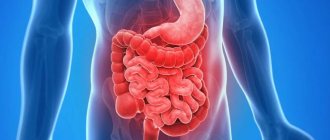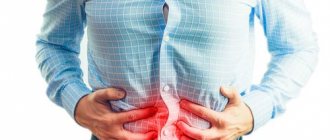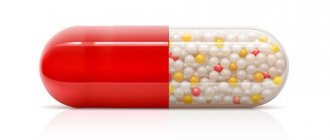Medicines for stomach pain should be taken only after the cause has been determined. The first question that needs to be answered in order to choose the right remedy for the stomach is: does it really hurt? If there is no doubt about the origin of the pain, you should find out the reasons for its occurrence.
How can you determine where your stomach is located?
Draw a conventional horizontal line through the navel. The stomach will be located above it. Approximately 2/3 of its parts are located in the left hypochondrium, the remaining part is in the epigastric region (under the costal arch of the chest). Therefore, stomach pain is most often felt in the area of the 4th intercostal space on the left.
Figure 1 - When your stomach hurts, you need to find out whether the stomach is to blame
Main causes of stomach pain
The need to take syrups or tablets for stomach pain most often results from:
- unhealthy diet - regularly skipping meals, eating dry food, overeating, fasting, alcohol abuse, eating sour, spicy food on an empty stomach;
- poisoning with low-quality products, inedible substances;
- cholecystitis - inflammation of the gallbladder, stones in it;
- pancreatitis - inflammation of the pancreas;
- gastritis, diverticulitis - inflammatory diseases of the gastric mucosa;
- stomach ulcer, duodenal ulcer;
- gastroesophageal reflux - the valve that separates the esophagus from the stomach does not work correctly, resulting in digested food being thrown into the esophagus;
- parasites – cause intoxication of the body, which is manifested by vomiting, nausea, bloating, etc.;
- intolerance to gluten, lactose, and other substances;
- prolonged stress.
Figure 2 - About 10% of stomach pain is caused by an ulcer
When is medication needed?
Most often, pain symptoms indicate certain problems and disorders in the body, therefore, without knowing the exact cause, it is not recommended to abuse medications.
First, you need to make sure that the syndrome is not associated with serious pathologies and does not require surgical intervention. Otherwise, instead of feeling better, the patient may experience various complications, which will be much more difficult to treat.
Uncomfortable pain occurs against the background of various problems - diarrhea, constipation, cramps, flatulence (increased gas formation, bloating) and others.
They can be eliminated through medications that have an analgesic and spastic effect.
How does it hurt?
The pain can be aching, sharp, dull, bursting, squeezing, cutting, stabbing, pulling.
| Nature of pain | Possible diseases |
| Sudden acute | Cholecystitis, pancreatitis, duodenal ulcer |
| Sudden sharp | Poisoning, chemical burn of mucous membrane, perforation of ulcer |
| Dull aching | Chronic gastritis, initial stage of ulcer. With gastritis, pain appears on an empty stomach and immediately after eating |
| Dull aching, turning into a burning sensation | Acute gastritis, ulcer |
| Spasms, contractions (most often at night or after eating) | Inflammation of the duodenum, ulcer |
| Mild aching pain that does not disappear for a long time | Polyp, malignant formation |
| Severe pain, contractions | Gastrointestinal infections |
| Severe pain in the upper abdomen that lessens over time but does not go away completely | Diseases of the large intestine (eg, colitis) |
| Severe pain in the navel area that moves to the right and up | Appendicitis |
A short-term “shooting” pain that is felt after a sudden movement or when inhaling indicates a spasm of the diaphragm. In this case, the stomach may not be to blame - such sensations are characteristic of circulatory disorders and inflammatory processes. Therefore, medications for stomach pain are likely to be ineffective.
Figure 3 - The nature of pain is important for diagnosis
To accurately make a diagnosis and prescribe effective treatment, a description of the pain is not enough. You need to undergo a series of tests, for example, for the presence of Helicobacter pylori (the bacterium that causes stomach ulcers), as well as ultrasound, FGDS. That is why you should ask not a pharmacist, but a gastroenterologist, what to drink for stomach pain.
Under no circumstances should you endure stomach pain or suppress it with medications without a doctor’s prescription. Painful sensations are a signal that something is already going wrong in the body, and urgent professional intervention in its functioning is necessary.
Medicines for stomach pain that you can take while waiting for the doctor
It happens that the pain in the stomach becomes unbearable, and you still have to take some kind of pill. This should be done as a last resort, since taking the drug can distort the picture of the disease and give grounds for an incorrect diagnosis. In general, doctors allow you to take:
- analgesic - medications that temporarily relieve pain, for example, analgin. At the same time, the situation in the stomach does not change, and there is no need to delay visiting a doctor;
- antispasmodic - drugs that stimulate the smooth muscles of internal organs: Papaverine, No-Shpa, Duspatalin, Trimedat. As a result, the passage of food and gases is facilitated, and muscle spasms disappear.
If you have stomach pain, it is better not to take pills immediately before seeing a doctor. To help quickly make the correct diagnosis and prescribe treatment, prepare the following information:
Figure 4 - Suspensions and tablets for stomach pain should not be used before examination by a doctor
- the circumstances of the pain (before, during, after eating, what you ate, drank, or how long you didn’t eat or drink, whether there were abdominal injuries, blows, stress);
- other symptoms: nausea, bloating, foul-smelling gas, rash, vomiting, heartburn, dizziness, diarrhea/constipation, change in the consistency and color of stool, blood, mucus in the stool;
- did you take medications for stomach pain before applying, what are you currently taking for other diseases;
- What changes have you had in your health status recently?
Try to move less, do not eat and, if possible, do not drink. You cannot give enemas or take laxatives.
Note! Never use a hot heating pad or other heat. Sometimes this does help reduce pain, but it increases inflammation, bleeding and pus formation. Such self-medication can be life-threatening.
Figure 5 - If you have stomach pain, you should not use a heating pad
Medicines for discomfort in the intestines and stomach
There is no miracle pill that can save you from any pain attack in the abdominal cavity. It is necessary to select tablets for abdominal pain, taking into account the causative factor, recommendations of specialists and manufacturers of the product. The intensity of the unpleasant sensation can vary, as can its consequences. Drugs from several therapeutic groups taken in combination will help.
A painful attack occurred at home or at work - what to do?
Abdominal pain is usually associated with eating poor quality food and disorders of the gastrointestinal tract (GIT). Even strong emotions provoke discomfort.
In such situations, stomach medicine is taken along with sedatives. Common causes of discomfort in the upper abdominal cavity are overeating and incompatible foods.
In gastrointestinal pathologies, painful attacks have different localization and intensity.
Many people do not go to the doctor and take stomach pills to quickly eliminate discomfort. Even the most devoted proponents of traditional medicine admit that drugs work faster than herbs and natural products. In addition, the analgesic effect of folk remedies is often temporary.
Important! According to doctors, paracetamol has long been considered the safest and most effective analgesic for children. However, now they are no longer so sure of this. It should be borne in mind that small doses of the drug have a weak analgesic effect. With increasing dosages, paracetamol can cause nausea and vomiting, and liver inflammation.
Remedies for stomach pain in acute gastritis
Inflammation of the gastric mucosa is accompanied by nausea, belching of rotten contents, vomiting, and diarrhea. Heaviness and pain appear in the epigastric region. The course is rapid, but the disease usually lasts no more than 5 days.
Tablets for abdominal pain caused by gastritis:
- Omez is a drug for heartburn, nausea, pain, and vomiting.
- No-spa is an antispasmodic agent.
- Activated carbon is an adsorbent.
- Plantaglucide is a herbal preparation, non-narcotic analgesic, anti-inflammatory agent.
In the first days, you must refuse to eat and stay in bed. Recommended procedures: gastric lavage with soda solution and cleansing enema.
Tablets for chronic gastritis
With a long-term inflammatory process in the gastric mucosa, dull, aching pain appears in the epigastric region. Chronic gastritis with high acidity is characterized by persistent, painful heartburn. Secretory insufficiency is manifested by nausea, belching of food, vomiting, and diarrhea.
Important! Dyspeptic symptoms caused by the intake of certain foods occur immediately or after a certain time after eating.
List of tablets for abdominal pain with chronic gastritis:
- Halidor is an antispasmodic.
- Escape is an antiulcer, antiseptic drug.
- Gastracid is an adsorbent, enveloping agent.
- Rabeloc is a drug used to suppress excess acid production in the stomach.
- Probifor is an immunomodulator, a means for normalizing intestinal microflora.
- Gastrofarm is a medicine for pain, heartburn, a probiotic remedy.
- Festal is an enzyme preparation.
If during diagnostics the patient is diagnosed with Helicobacter pylori bacteria, then antibacterial therapy is prescribed. Penicillins, cephalosporins, sulfonamides, quinolones are used for eradication - getting rid of an infectious agent. Trade names of drugs: Amoxicillin, Metronidazole, Cedex, Phthalazole.
Remedies for eliminating biliary colic
An attack in diseases of the liver and pancreas lasts from several minutes to several days. Body temperature often rises, nausea, bloating, and vomiting appear. Unbearable pain due to stones in the bile duct first occurs in the right hypochondrium, then spreads throughout the abdomen.
What pills to take for biliary colic:
- No-shpa forte, Drotaverin, Halidor, Spasmol, Spasmonet - remedies for abdominal cramps (antispasmodics).
- Pentalgin, Spazmalgon - anti-inflammatory and painkillers.
- Grinterol, Urosan, Ursodez are bile preparations, hepatoprotectors.
- Ursofalk is a remedy for the prevention of stone formation.
- Enterosan is an enzyme preparation to improve digestion.
Attacks of biliary colic may be rare, but without treatment and inattention to diet, the stomach hurts weekly. X-ray studies and ultrasound will show the presence of stones in the gall bladder.
Pain relief for pancreatitis
The inflammatory disease occurs with disruption of the secretory and hormonal activity of the pancreas. Sharp pain in the left side in front of the hypochondrium radiates to the upper abdomen, sometimes to the right hypochondrium. Discomfort occurs after eating fatty foods or drinking alcohol. Often the attack is accompanied by vomiting.
Chronic pancreatitis is the outcome of the acute form of this disease. Acute pancreatitis is treated in a hospital: antispasmodics, pain medications, medications to overcome intoxication, and normalize the acid-base balance in the gastrointestinal tract are administered. If conservative treatment fails, part of the pancreas may need to be removed.
In case of exacerbation of chronic pancreatitis, you should ease the load on the gastrointestinal tract and adhere to a diet. For abdominal pain, take Almagel A suspension, Omeprazole tablets, No-shpa forte. Hermital. Probifor and Bifidumbacterin are suitable for normalizing intestinal microflora. After the pain subsides, they switch to enzyme preparations Enterosan, Creon, Mezim, Festal,
What to take for pain in the intestines?
Unpleasant sensations in the navel area, above or below the waist are characteristic of gastroenteritis, enteritis, enterocolitis and diverticulitis. A combined medicine for intestinal pain, Meteospasmil, simultaneously eliminates spasms and bloating. Such combination drugs are in the minority on pharmacy shelves. Another option is to take several over-the-counter remedies.
Tablets for spasms and pain in the intestines (antispasmodics):
It happens that antispasmodic tablets do not help and cannot cope with severe abdominal pain. Then these drugs are taken together with the drug Spazmalgon and the liquid herbal remedy Romazulan.
Pain and tension in the abdominal cavity are often combined with increased gas formation and colic in the intestines. The carminatives Espumisan and Sab Simplex cope with these symptoms.
If a child has a stomach ache, it is better to give the so-called children's dosage forms - drops or suspension for oral administration.
Adsorbent agents Activated carbon, Smecta and Enerosgel are taken for colic and flatulence after eating poor quality food, foods with allergens, or overeating. The drug Motilium to activate gastric motility will help prevent and eliminate existing discomfort.
This is a common cause of pain after eating. You can take tablets Enterosan, Mezim forte, Pancreatin, Festal. They contain enzymes that improve digestion in the intestines. It is important to remember that during gastroduodenitis it is recommended to eat in small portions, boil foods, steam them, and avoid consuming spices and alcohol.
To normalize the intestinal microflora, it is recommended to drink 40–60 drops of liquid Hilak Forte. You can replace it with Enterol and Probifor powders dissolved in water (available in capsule form).
For constipation, take laxatives Duphalac and Macrogol, which increase the fluid content in the stool. Antidiarrheals Loperamide and Imodium help with frequent bowel movements. They thicken stool and increase transit time through the colon.
It may happen that there are no pills or that taking them is undesirable. Then, as an analgesic and enveloping agent, use flax seed infusion: 2 tbsp. l. for 500 ml of boiling water. Take 100 ml 4 times a day before meals.
If the cause of abdominal pain is worms
To get rid of intestinal parasites at home, medications and folk remedies are used.
Tablets with the active ingredient Albendazole have a wide spectrum of anthelmintic activity: Zentel, Nemozol, Vormil. The same drugs are used to treat giardiasis.
Giardia is a microscopic parasite that spreads from the intestines to other organs through the bloodstream. Painful conditions are caused mainly in children; for adults they are almost not dangerous.
Folk remedies for eliminating worms:
- fresh garlic and infusion of cloves;
- infusion of tansy flowers;
- pumpkin seeds;
- wormwood decoction.
Read more about other means here.
Pumpkin seeds and garlic are consumed internally, decoctions of wormwood and tansy are used mainly for sitz baths and cleansing enemas. Folk remedies act more gently and are safer for the human body compared to chemicals. Unfortunately, treatment is long and not always successful.
Remedies for pain before and during menstruation
Often, a painful condition before menstruation is observed in women with gynecological problems, diseases of the cardiovascular system and gastrointestinal tract.
Most often, the lower abdomen hurts during menstruation due to hormone imbalance and kidney disease.
If the cause of discomfort during menstruation is diseases of the female genital area and excretory organs, then the effect of painkillers will be short-lived.
Important! You can take non-steroidal anti-inflammatory drugs (NSAIDs) 2-3 days before your period begins.
Baralgin and Piroxicam are produced in tablet form. For pain and abdominal cramps during menstruation, you can use rectal suppositories and tablets: Cefekon N, Diclofenac, Naproxen. Exacerbation of stomach diseases is a contraindication for the use of NSAIDs.
Drugs in this group act on the gastrointestinal mucosa. After taking the pills, you may experience abdominal pain and nausea. If you take it in a short course and do not exceed the dosage, the negative effect on the gastrointestinal tract will be minimal.
The optimal duration of taking NSAIDs is from 3 to 5 days.
Source: https://kishechnik-zhivot.ru/preparaty/ot-diskomforta-v-kishechnike-iv-zheludke-lekarstva
In what dosage forms are stomach medications available?
Medicines for the stomach are available in the form of tablets, syrups, suspensions and powders, which should be dissolved in juice or water. Some drugs are available in different dosage forms. It depends on their purpose and characteristics of the action. For example, enveloping and adsorbing drugs (Almagel, Maalox, Phosphalugel, Gaviscon) are produced in the form of a suspension, and children's drugs are in the form of syrup.
Medicines for stomach pain in tablets:
- analgesics;
- antacids;
- proton pump blockers;
- astringents;
- gastroprotectors;
- combination drugs;
- antispasmodics.
What to drink for your stomach?
What exactly to drink for stomach pain depends on the diagnosis:
- for gastritis: Smecta, Almagel - to restore the gastric mucosa and against diarrhea, to relieve inflammation - Iberogast, to eliminate spasms - No-Shpa, Cerucal, to correct the enzyme composition of the medium - Mezim, Digestal;
- for cholecystitis, gallstones: Allochol, Gepabene;
- in case of poisoning: sorbents Enterosgel, Lactofiltrum, Activated or White carbon, Smecta. Analgesics will also help get rid of stomach pain in the initial stages of the disease: Analgin, Baralgin.
- for high acidity: antacids Gaviscon, Rennie, Maalox;
- for ulcers: wound healing - Methyluracil, Actovegin, to suppress Helicobacter pylori - Ampicillin, Pilobact-Neo, proton pump blockers Omez, Omeprazole, Nexium, other drugs for complex treatment, selected individually based on test results.
A number of medications for heartburn and stomach pain are useful in a variety of situations. For example, Smecta can be taken for stomach pain caused by eating disorders, heartburn, bloating, acute or chronic diarrhea, gastritis, stomach and duodenal ulcers, colitis.
Many medicines have analogues. For example, to relieve spasms of the smooth muscles of internal organs, you can buy No-Shpu or Drotaverine. The main active ingredient of these drugs is the same – drotaverine. However, if you pay about $1 for 30 tablets of Drotaverine, then for the same number of yellow tablets called No-Shpa - about $2.
Medicine for stomach and intestinal discomfort
Unpleasant sensations in the intestinal area (from the lower border of the ribs to the groin) is a condition that can be caused by various reasons.
Most often they are associated with digestion or errors in diet (excessive consumption of fatty, fried, sweet foods). But cramps and pain can also indicate serious diseases of the digestive system. Medicines for abdominal discomfort should be prescribed by a gastroenterologist. Or at least a therapist. We will provide a general list of what exactly can be prescribed. Below is a list of drugs that are used to eliminate abdominal cramps.
Discomfort in the intestines: medications for abdominal cramps
For irritable bowel syndrome, different medications are used, among them relatively “light” ones, which have practically no side effects and can only relieve spasms, and stronger drugs that are taken in courses and help cure intestinal diseases that cause constant rather than periodic feeling of discomfort (gastroesophageal reflux disease, gastroduodenal pathology, intestinal obstruction after surgery, etc.).
The list of medications for abdominal discomfort (relieving spasms) looks like this:
The drug eliminates intestinal muscle spasms, colic, and discomfort in the gastrointestinal tract. Prescribed to patients over 12 years of age.
Relieves spasms of smooth muscles, dilates blood vessels. It has a wider scope of application, as it is able to relieve spasms of cerebral vessels and accelerate labor in pregnant women.
Eliminates spasms of the gastrointestinal tract muscles, while maintaining normal intestinal motility.
When taken, the smooth muscles of the gastrointestinal tract relax, the spasm goes away. Used for irritable bowel syndrome, intestinal colic.
Regulates the motility of the digestive system. Relieves spasms of smooth muscle tissue of the digestive tract.
Antispasmodic, used for painful conditions of the gastrointestinal tract, nagging and severe pain in the intestines, discomfort in the stomach. The drug is also prescribed for dyskinesia of the gallbladder.
Causes relaxation of vascular smooth muscles, eliminating spasm. It is used to eliminate pain in any organs of the gastrointestinal tract, liver and kidney colic. Among other things, it has an immunostimulating effect.
Antispasmodic. Available in the form of suppositories and tablets. Relieves spasms of smooth muscles of the gastrointestinal tract and genitourinary system. It is used in pregnant women to facilitate labor.
Affects the smooth muscles of the blood vessels of internal organs. Reduces blood pressure. A strong medicine, in the form of injections, is used to treat diseases of the cardiovascular system. In tablets it can be used to eliminate spasms in the intestines.
Available in the form of tablets, injections, suppositories. Relieves spasms of smooth muscles of the abdominal organs, is used not only for colitis, but also for bronchospasm, angina pectoris, to relieve increased uterine tone in early pregnant women.
Antispasmodic. Reduces the tone and motor activity of smooth muscles of internal organs.
Please note that the above is a list of antispasmodics that a doctor can prescribe to eliminate spasms of intestinal smooth muscles.
If they were caused by eating heavy, fatty foods, then treatment may stop there.
If discomfort in the intestines is constantly felt, then a thorough examination and prescription of drugs from other groups (for the treatment of dysbiosis, etc.) cannot be avoided.
What pills should you take if you have intestinal problems? For many people, medicine is a complex and incomprehensible science. In fact, it is built on logic and facts that we know about our body.
The two main directions in the treatment of any disease are eliminating symptoms and influencing the cause.
To choose the right medicine for the intestines, you need to determine what specifically bothers the patient, as well as why the discomfort appeared.
p, blockquote 1,0,0,0,0 —>
p, blockquote 2,0,0,0,0 —>
Symptoms of intestinal diseases
This organ belongs to the digestive system and performs the following functions:
p, blockquote 3,0,0,0,0 —>
- Breaks down foods into digestible elements.
- Ensures the absorption of essential nutrients into the blood.
- Removes toxins.
- Increases immune defense.
With intestinal diseases, the performance of certain functions is disrupted, which allows the doctor to fairly accurately determine the nature of the pathology. Signs of malfunction of this organ are listed below.
p, blockquote 4,0,1,0,0 —>
- Abdominal pain. In a healthy state there should be no discomfort. If there are complaints, the doctor pays attention to the location, intensity and characteristics of the unpleasant sensations. Their connection with food intake and bowel movements is also important.
- Pain in the navel area indicates a disease of the small intestine. Usually the patient feels them as pulling or aching. If there is a feeling of distension or excessive gas formation, a malfunction of the thick section is suspected. In this case, relief occurs when taking carminatives or after defecation.
- Diarrhea. This condition is considered to be loose bowel movements that occur more than 3 times a day. The symptom can be observed during the inflammatory process in any part of the intestine, as well as the stomach and duodenum. Inclusions in the stool - foam, streaks of blood, undigested pieces of food, mucus - are of diagnostic importance.
- Constipation. If this is the only discomfort that worries a person, the cause may not be a disease. Delayed bowel movements or hard stool consistency are caused by stress, hormonal changes, poor diet, fluid deficiency, and taking certain medications.
- Flatulence. Abdominal bloating not only indicates a malfunction of the intestines, but also often causes severe pain to the patient due to a sharp stretching of its walls. The symptom is more often observed in the evening.
Changes in other organs and systems. Deterioration in nutrient absorption affects the condition of the skin, general well-being, body weight, blood counts, and the female menstrual cycle. Often patients are not even aware of the true cause of their problems.
p, blockquote 5,0,0,0,0 —>
p, blockquote 6,0,0,0,0 —>
Source: https://tsitologiya.su/zheludok/lekarstvo-ot-diskomforta-v-zheludke-i-kishechnike
Which is better - Gaviscon or Almagel?
The effect of both of these gels for stomach pain is that they form a dense barrier (film) that envelops the gastric contents and is not absorbed during digestion. This protects the inflamed stomach walls from the effects of acid. At the same time, the composition of the gastric juice itself does not change, and food digestion occurs in full. The gel-like film also protects the esophagus if stomach contents are thrown into it, preventing heartburn and inflammation. To get rid of stomach pain, these gels or suspensions should be taken after meals without drinking water. The dose of the drug lasts approximately 4 hours. The cost of both drugs, depending on the offers of pharmacy chains, differs by literally $0.3–0.5.
Figure 6 - A number of drugs for stomach pain have a similar effect
You should make a choice based on your health status, side effects and the composition of the drugs. For example, Gaviscon is allowed for pregnant women to take, but Almagel is not recommended because the necessary studies have not been conducted on it. Therefore, the right to make the final decision on prescribing the drug is transferred to the doctor, who will weigh the benefits for the mother and the likelihood of harm to the fetus.
How to get rid of lower abdominal pain
The large intestine consists of smooth muscle. The pain is most often provoked by its spasms. In this case, a single dose of antispasmodics (No-Shpa, Buscopan, Mebeverine, Spasmomen) is acceptable. Painkillers from the group of non-steroidal anti-inflammatory drugs are not effective for intestinal pain. They can cause harm - aggravate the inflammatory process or blur the clinical picture.
If the pain is frequent, regular, intense, but has arisen for the first time, you should consult a doctor yourself or call an ambulance. Intestinal pathologies are treated depending on their nature. In case of infectious lesions, you will need to take antiparasitic, antibacterial or antiviral drugs (Vormil, Levomycetin, Nifuroxazide, Isoprinosine). In parallel, regulators of intestinal flora (Subalin, Enterozermina, Canadian yogurt) are prescribed.
For inflammatory lesions, complex treatment is prescribed, which includes sorbents (Atoxil, Smecta, Enterosgel), enveloping and astringent agents (for example, flaxseed infusion), herbal remedies (intestinal infusions, homeopathic medicines), hormonal and immunosuppressive drugs. For neoplasms, surgery, chemotherapy and radio wave therapy may be required. In case of obstruction and intestinal volvulus, surgical intervention is performed, the cause of the obstruction is eliminated, and the pathological loop is straightened.
Diet is a necessary part of intestinal healing. It is important to eat enough food, fiber in the form of vegetables and cereals, and easily digestible meat and fish dishes. Refractory fats, coarse dietary fiber, sour, sweet and gas-forming foods are excluded from the diet.
The intestines are a vital organ for humans, so a pain attack is a reason to consult a specialist. Treatment of intestinal diseases is more effective in the early stages of pathology development. In advanced forms, surgical removal of the affected parts of the colon may be required.
There is no miracle pill that can save you from any pain attack in the abdominal cavity. It is necessary to select tablets for abdominal pain, taking into account the causative factor, recommendations of specialists and manufacturers of the product. The intensity of the unpleasant sensation can vary, as can its consequences. Drugs from several therapeutic groups taken in combination will help.
What tablets for stomach pain can be used during pregnancy?
Pregnancy significantly narrows the list of medications for stomach pain that a doctor can prescribe to a patient. Most often, pregnant women experience heartburn, which has physiological causes. Since the stomach is a hollow organ, the growing uterus compresses it the most. This is especially noticeable in the third trimester. Such heartburn is treated symptomatically - you can take Smecta, Rennie, and other antacid drugs.
Figure 7 - Many medications for stomach pain are contraindicated during pregnancy
In more complex cases, when a pregnant woman is diagnosed with gastritis, ulcers, cholecystitis or pancreatitis, treatment regimens are drawn up by doctors. In this case, the risk to the fetus is compared with the benefit to the mother. If the disease can be “preserved,” maintenance medications are prescribed, and the main treatment is transferred to the postpartum period. In any case, there is no need to panic: new remedies for stomach pain with wide areas of application are constantly being developed.
Medicines for children
Before using certain medications to relieve abdominal pain in a child, it is necessary to accurately determine the location of the discomfort, its nature and strength.
You should definitely consult a doctor, because if you select painkillers on your own incorrectly, it can complicate making an accurate diagnosis.
This is especially true in relation to acute appendicitis.
The pain syndrome disappears, but after some time it appears with renewed vigor. If time is lost, there is a high risk of developing serious complications such as sepsis and peritonitis.
It must be remembered that taking medications is possible only at normal body temperature, in the absence of signs of poisoning, with minor stomach upsets with symptoms of diarrhea, or with cramps due to poor diet.
It is not recommended to take analgesics in the presence of an intestinal infection, vomiting, or fever, since this often indicates dangerous disorders in the digestive system.











